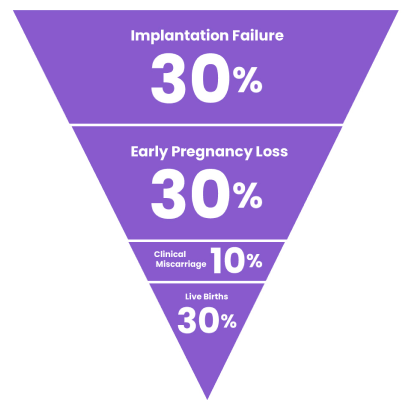Reducing the Risk
of Miscarriage

Reducing the Risk
of Miscarriage

Only 40-60% of embryos – from both natural conception and IVF – result in live births,36 making early pregnancy loss a relatively common and assuredly heartbreaking experience. Genetic disorders (chromosomal abnormalities) in the pregnancy tissue are one of the most frequent causes of miscarriages.37
Genetic testing in IVF is trying to help reduce miscarriages.
Miscarriages carry deep emotional and human costs.38
Miscarriages, which are when a pregnancy ends on its own before 20 weeks, are more common than many people realize. An estimated 23 million miscarriages happen every year around the world. This equals approximately 44 pregnancy losses occur every minute.39
Up to 61%
of early pregnancy losses
are due to detectable
chromosomal
abnormalities.40
Up to 61%
of early pregnancy losses
are due to detectable
chromosomal
abnormalities.40
Women over 40
have a sporadic
miscarriage rate
approaching 50%.41
Genetic testing is helping to reduce miscarriages.
Human reproduction is a very selective process.17 The assisted reproductive technology (ART) preimplantation genetic testing (PGT-A) used in IVF aims to mimic the body’s natural process of eliminating genetically abnormal embryos, thereby reducing the incidence of miscarriage.79
IVF with PGT-A Testing
- 54-62% of PGT-A screened embryos are classified as abnormal and non-viable for transfer.45,46
- 31% reduction in pregnancy loss with PGT-A screened embryos vs. convention-IVF.47
- 41% higher birth rate, PGT-A tested embryo transfers vs. non-PGT-A transfers.48

Natural Conception
- 22-30% of embryos are lost before pregnancy is clinically detected (preclinical losses).42,43
- 10-31% of all clinically recognized pregnancies are lost after implantation (age dependent).42,44
- 40-60% of human embryos and fetuses are lost from fertilization to birth.36

PGT-A testing
significantly
reduces IVF
miscarriage rates.46,80,81
By identifying and excluding embryos with chromosomal abnormalities before transfer, PGT-A helps select embryos that have a better chance of implantation, pregnancy, and live birth, which improves IVF outcomes.49


